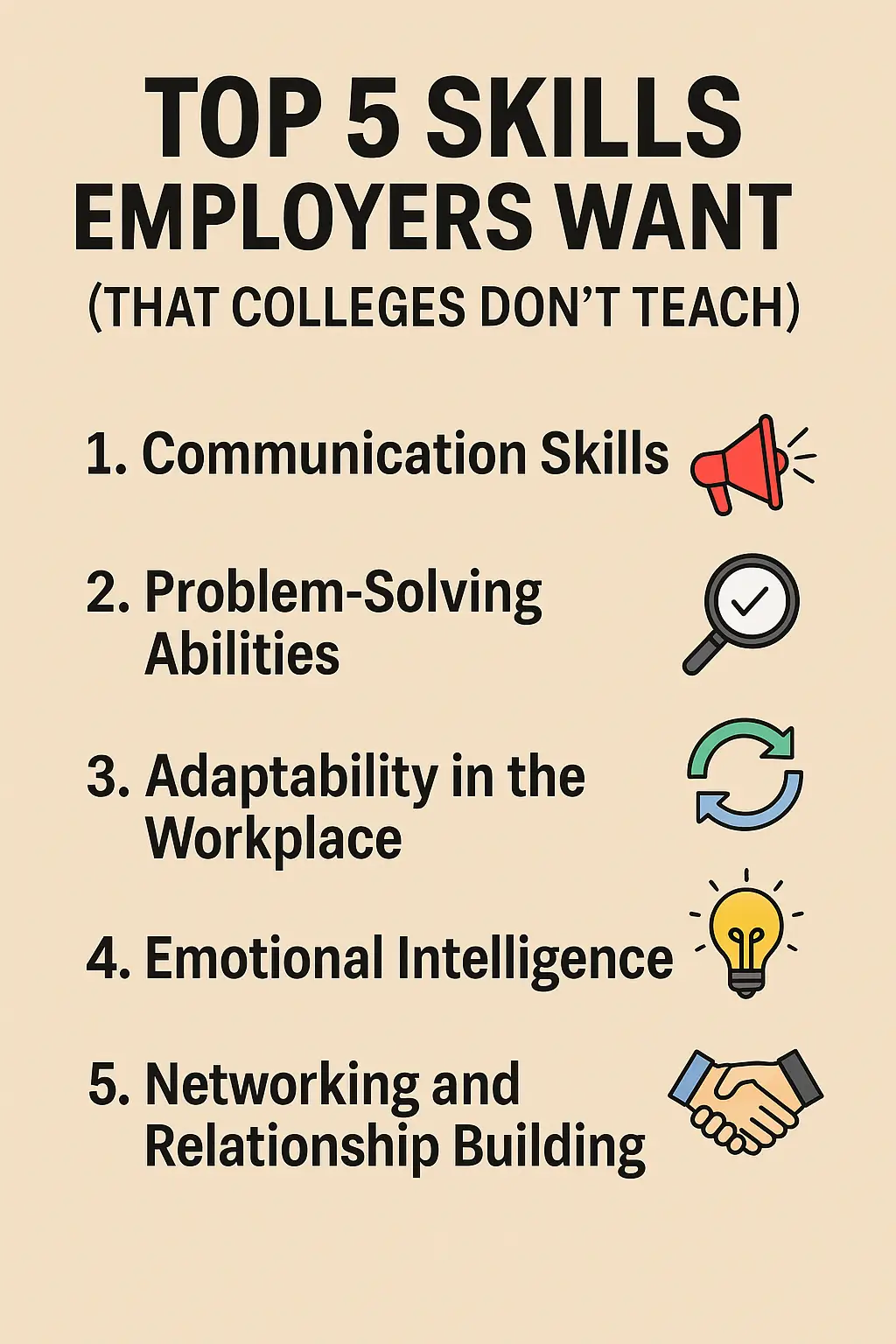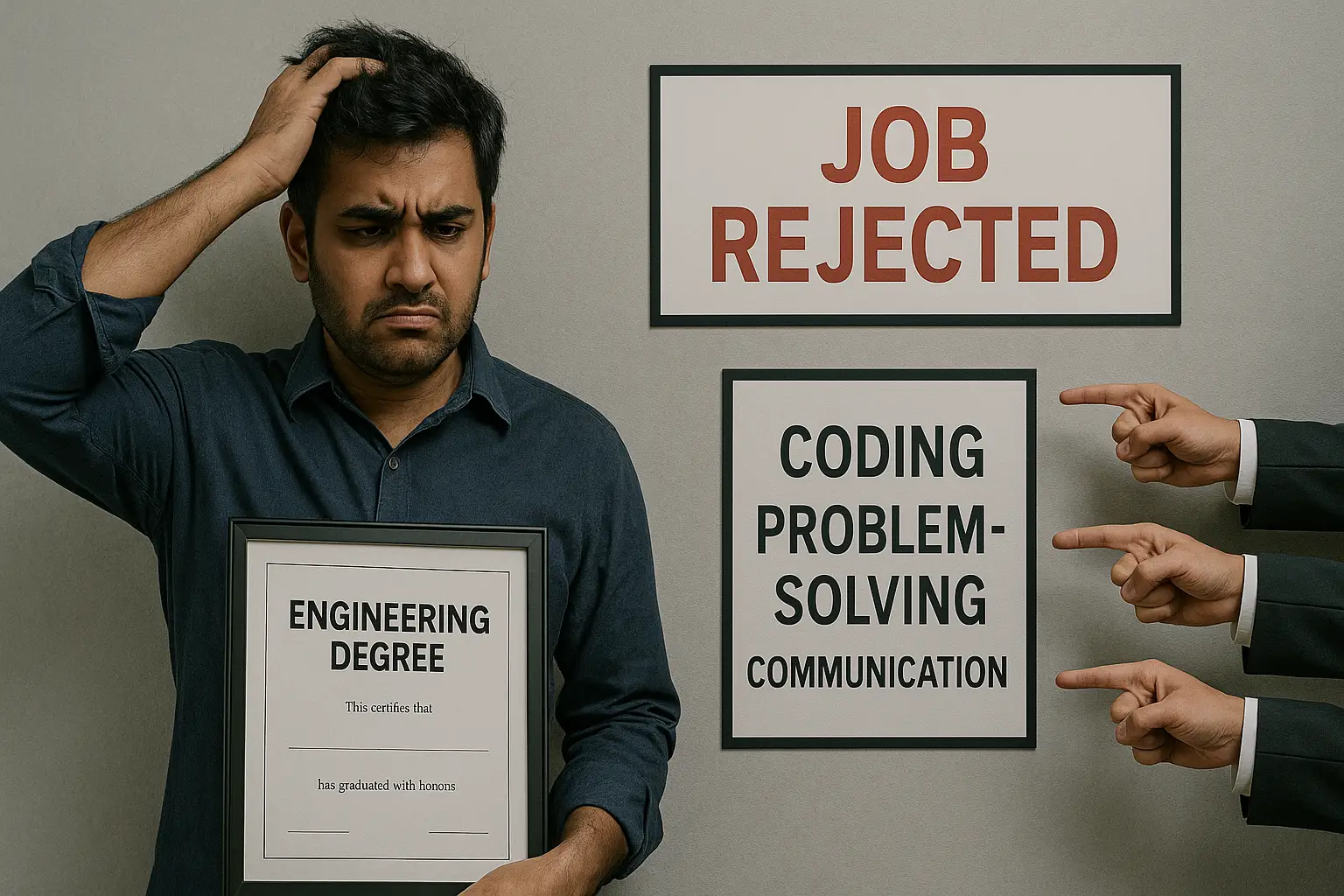Hey there! Let’s dive into a topic that’s been buzzing around lately—what employers are really looking for in the job market. Spoiler alert: It’s not always about what you learned in college. Trust me, as someone who’s been through the hiring process more times than I’d like to admit, understanding these skills can be a
Hey there! Let’s dive into a topic that’s been buzzing around lately—what employers are really looking for in the job market. Spoiler alert: It’s not always about what you learned in college. Trust me, as someone who’s been through the hiring process more times than I’d like to admit, understanding these skills can be a game-changer for your career.
Table of Contents
1. Communication Skills 📢
2. Problem-Solving Abilities 🔍
3. Adaptability in the Workplace 🔄
4. Emotional Intelligence 💡
5. Networking and Relationship Building 🤝

1. Communication Skills 📢
You know, it’s funny. We spend years in college writing papers and giving presentations, yet many grads still struggle with effective communication in the workplace. It’s not just about stringing words together—it’s about being clear, concise, and persuasive. Whether you’re pitching an idea or resolving a conflict, strong communication can set you apart.
In today’s fast-paced work environment, the ability to communicate effectively can significantly influence career trajectory. Communication in the workplace involves not only verbal exchanges but also non-verbal cues, active listening, and emotional intelligence. Employers are seeking individuals who can articulate their thoughts clearly and influence others positively. Good communicators are often seen as leaders because they have the ability to convey vision and motivate others.
One time, I was in a meeting where two colleagues couldn’t see eye to eye. It was tense! But then, someone stepped in and articulated both perspectives clearly, helping everyone understand the core issue. That person wasn’t just a mediator—they were a communicator. You might be thinking, “But how do I improve?”
Well, practice is key. Engage in discussions, solicit feedback, and even join a public speaking club like Toastmasters. And remember, listening is just as important as speaking.
😌 Listening actively not only helps in understanding others better but also builds trust and respect among colleagues, paving the way for more effective collaboration.
2. Problem-Solving Abilities 🔍
Imagine being the go-to person when something goes wrong. That’s the power of solid problem-solving skills. It’s about analyzing situations logically, identifying the root cause, and coming up with effective solutions. Colleges often focus on the theoretical aspects, but real-world problems? They’re a whole different beast.
Problem-solving is an essential skill that transcends all industries and roles. It involves critical thinking, creativity, and the ability to work under pressure. Employers value individuals who can approach challenges with a calm and analytical mindset, dissecting issues and proposing actionable solutions. This skill demonstrates initiative and the ability to add value in any position.
I’ve had moments where I’ve been stuck, staring at a problem that seemed unsolvable. But then, I’d take a step back, look at it from a different angle, and voila! The solution would reveal itself. It’s like solving a puzzle where every piece matters.
To hone this skill, tackle challenges head-on. Participate in hackathons or strategy games. Engage in activities that require strategic thinking and collaboration with others to find solutions. And remember, there’s no one-size-fits-all approach. Each problem is unique, and so should be your solutions.
🧩 By cultivating a mindset that embraces challenges as opportunities, you prepare yourself to handle unexpected situations with confidence and creativity.
3. Adaptability in the Workplace 🔄
If there’s one thing that’s constant in the corporate world, it’s change. Whether it’s a new software, a sudden shift in company policy, or an unexpected project, adaptability is crucial. It’s about being flexible and open to new ways of doing things.
The pace of technological advancement and globalization has made adaptability a key skill in the modern workforce. Those who can quickly adjust to new environments, learn new skills, and embrace innovative approaches are highly valued. Adaptability is not just about survival; it’s about thriving in changing circumstances and contributing positively to organizational success.
I recall a time when my company transitioned to a new project management tool. It was chaotic, to say the least. But those who adapted quickly not only survived but thrived. They became the go-to experts, helping others navigate the change.
So, how can you become more adaptable? Embrace change with a positive mindset. Seek out new experiences, and challenge yourself to step out of your comfort zone. This might involve taking on new responsibilities or volunteering for projects that require skills you haven’t fully developed yet. Remember, growth happens outside the comfort zone.
🌟 Being adaptable also means being open to feedback and learning from both successes and failures, using those experiences to improve continuously.
4. Emotional Intelligence 💡
Emotional intelligence (EI) is the ability to understand and manage your emotions, as well as those of others. It’s about empathy, self-awareness, and interpersonal skills. In the workplace, EI can help you build stronger relationships and navigate tricky situations with ease.
In a world where teamwork and collaboration are crucial, emotional intelligence has become a highly sought-after skill. It involves recognizing your own emotions and those of others, which can improve communication and collaboration. Individuals with high EI can manage stress effectively, resolve conflicts, and lead teams with empathy and understanding.
I once worked with a manager who had incredible EI. She could sense when the team was stressed and knew exactly how to boost morale. Her empathy and understanding made her a beloved leader.
To boost your EI, start by being mindful of your emotions. Practice empathy by putting yourself in others’ shoes. Understanding different perspectives can lead to more inclusive and effective decision-making. And most importantly, learn to manage stress and conflict constructively.
🌈 Developing emotional intelligence involves continuous self-reflection and a willingness to adapt one’s behavior to foster a positive and productive work environment.
5. Networking and Relationship Building 🤝
It’s often said, “It’s not what you know, but who you know.” Networking isn’t just about collecting business cards—it’s about building genuine relationships. These connections can lead to new opportunities, collaborations, and even friendships.
Networking is crucial in today’s job market. It involves building and maintaining relationships that can provide support, information, and opportunities. Effective networking can open doors that might otherwise remain closed, allowing you to advance your career and grow professionally.
When I first started my career, I was hesitant about networking. But once I started attending industry events and engaging with others on platforms like LinkedIn, my perspective changed. I met amazing people who not only enriched my professional life but also became mentors and friends.
To enhance your networking skills, be proactive. Attend events, join professional groups, and don’t hesitate to reach out to people you admire. Remember, a simple “hello” can lead to endless possibilities.
🌟 Networking is about quality, not quantity; focus on building meaningful connections that can offer mutual benefits over time. Be genuine in your interactions and approach networking as an opportunity to learn and grow alongside others in your field.
Conclusion: Bridging the Gap Between Education and Skills
So there you have it—the top skills employers are looking for that you might not have picked up in college. But don’t worry! It’s never too late to learn and grow. Whether it’s through self-study, workshops, or mentorship, there’s a world of resources out there to help you bridge the gap.
Understanding these skills and their importance is the first step. The next step is actively seeking opportunities to develop them. This might involve enrolling in workshops, attending seminars, or seeking mentorship from those who exhibit proficiency in these areas. Practical experience is invaluable, and the more you expose yourself to different situations, the more adept you will become.
If you’re eager to further explore how to integrate these skills into your career, consider Dr. Dron Rathore’s Mission: Bridging the Gap Between Education and Jobs or check out Why Your Engineering Degree Isn’t Enough? for more insights.
In conclusion, while colleges provide a foundation of theoretical knowledge, it’s crucial to recognize the importance of these practical skills in the workplace. They are not only essential for personal development but also for career advancement. By investing time in developing these skills, you can position yourself as a valuable asset to any organization.
FAQs
1. Why don’t colleges focus on teaching these skills?
Colleges often emphasize theoretical knowledge, which is essential, but real-world skills like communication and problem-solving can be underestimated. It’s up to us to seek these skills beyond the classroom. Educational institutions are beginning to recognize the importance of soft skills, but the integration into curricula is a gradual process.
2. How can I develop these skills if I’m already in the workforce?
Continuous learning is key. Engage in workshops, seek mentorship, and embrace challenges that push you to grow. Remember, it’s a journey, not a race. Many organizations offer training programs to help employees develop these skills. Take advantage of these opportunities and seek feedback from colleagues and supervisors to guide your development.
3. Are these skills industry-specific?
Not at all! These skills are universal and can benefit you in any field or industry. From tech to healthcare, strong communication, adaptability, and emotional intelligence are always in demand. Whether you’re working in a corporate office or a creative studio, these skills empower you to excel in diverse environments and collaborate effectively with others.
So, what are you waiting for? Let’s get the ball rolling and start honing these skills today. Your future self will thank you.
🌟 By committing to lifelong learning and personal development, you can thrive in the ever-evolving job market and achieve your career aspirations.


















Leave a Comment
Your email address will not be published. Required fields are marked with *